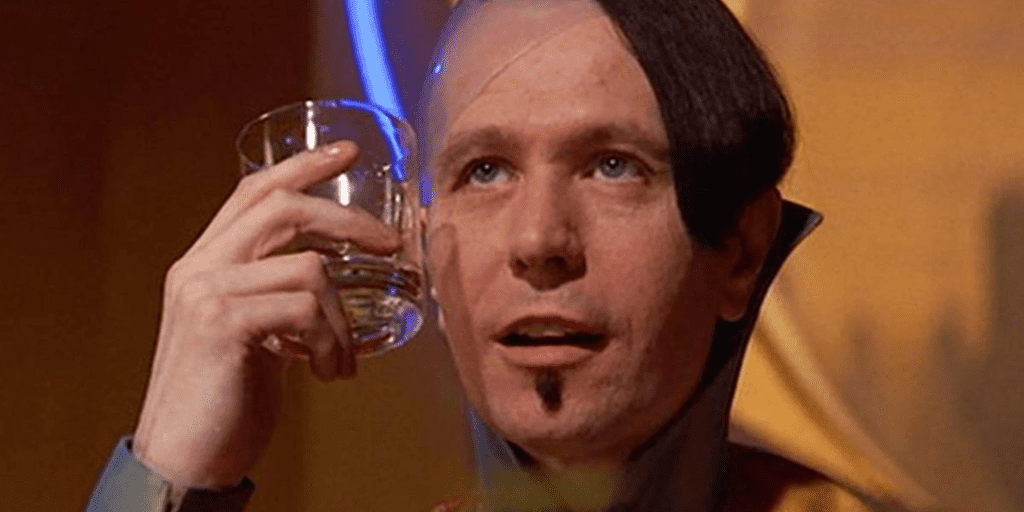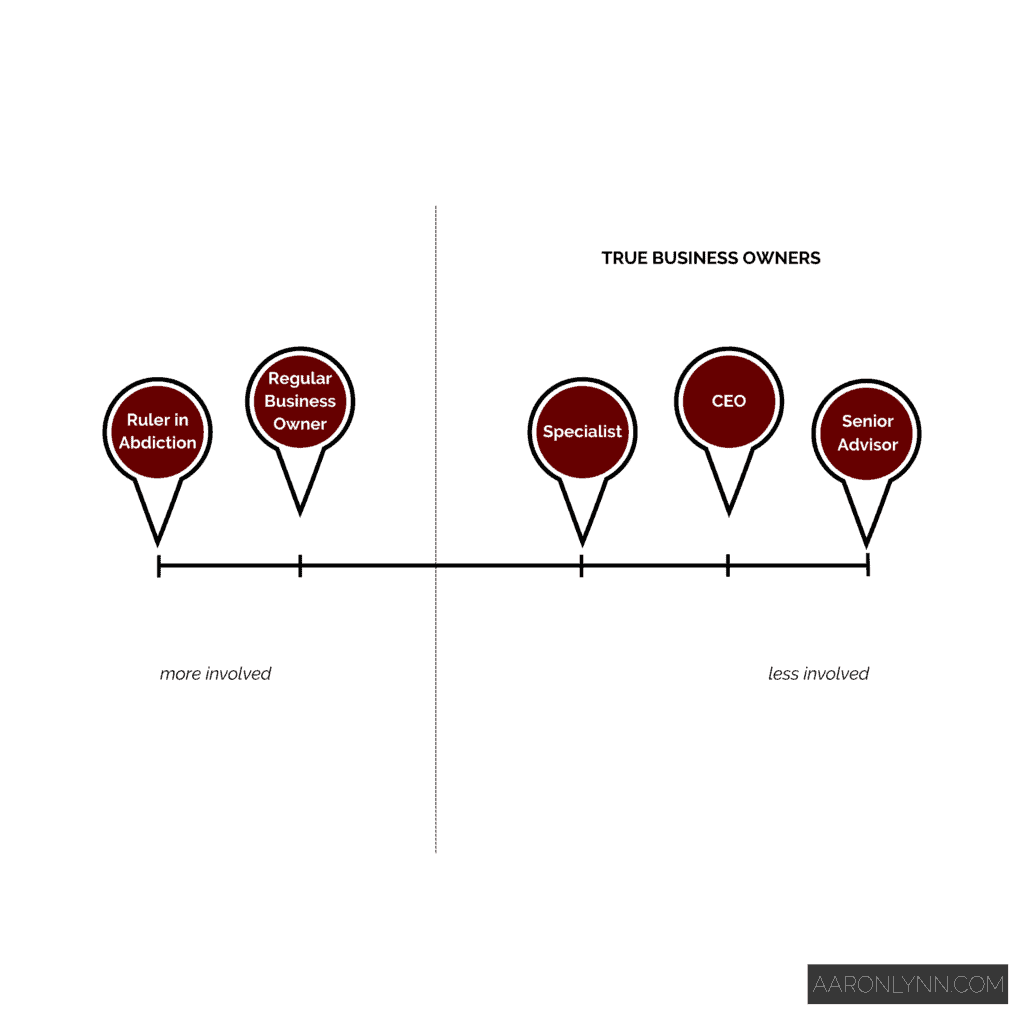
Society and Hollywood paints a bad image of business owners.
Think whisky, cigars, dark suits, dimly-lit boardrooms and Al Pacino in The Devil’s Advocate.

Society also invented the term “entrepreneur” and “hustle culture” to make business and business owners cool again.
But with the rise of tech entrepreneurs like Elon Musk and growing wealth disparities, even that has lost its lustre and has become synonymous with worker exploitation, privacy issues and faceless mega-corporations.

I’m going to offer you a different definition for what it means to be a true business owner — one that may surprise you.
What Is a True Business Owner?

True business owners are not that different from everyone else, except for one thing.
They value optionality, choice, and freedom.
They like having the choice to work… or not work.
To them, business is not about stacking Benjamins and never being in the office and never working — it’s about having the option to do so.
Note: If you don’t want to have anything to do with your business anymore, sell it and move on. So long as you remain the owner, you have to care about it… at least a little bit.
Different Types of Business Owners and Entrepreneurs
Business owners fall along a continuum for how involved they are in their business.
Here are the most common ones I have seen in my consulting work.
Types #1-3 below I would consider True Business Owners.
1. The Senior Advisor
This is also known as the “founder at large”.
This type of business owner writes books, gives speeches, does business development and drums up leads and clients for the business like no other.
They also occasionally come in for high-level strategic meetings to provide input, but they usually do not make decisions regarding operations — that has been delegated to a CEO-type who runs the day-to-day.
They are as removed from the business as they can be without actually leaving the business completely.
2. The CEO
The CEO type of business owner is still involved with the business, but at a high level.
They do the strategy, they make the tough calls and they do the business development.
They have a COO/GM-type who runs daily operations for them so that they can spend the afternoon playing golf and generating new business.
The CEO works anywhere from a couple of hours a day up to a 3-4 days a week in the business.
3. The Specialist
The Specialist is exactly like the CEO with one difference:
They have a particular business function that they absolutely LOVE and would never give up.
For some it is sales. For others, it is content. And for others it is thought leadership.
As best as they can, they’ve delegated everything else to their team.
They simply act as a CEO does, and also head up that one particular business function that they enjoy.
4. The Regular Business Owner
The regular business owner is the default type of business owner.
They do CEO work, COO work, and bits of everything else.
Most regular business owners aim to eventually become true business owners.
5. The Ruler in Abdication
Don’t be a ruler in abdication.
This is the business owner who hasn’t empowered their team to run daily operations… yet simply is never there to look after the business because they feel like they’ve “earned it”.
They want to retain the status and prestige of owning the business without carrying any of the responsibility or accountability for it.
As a result of this, work doesn’t get done, the team rebels and the company eventually implodes.
A good number of rulers in abdication are second-generation business owners who inherited the family business from their parents, but have zero interest in running it.
How to Become a True Business Owner

So if you’re a regular business owner right now, how do you become a true business owner?
Here’s how I’ve helped clients make the leap.
1. Define business and life for yourself
Your business is a reflection of you, so you need to start with defining for yourself what it is you want for your business and your life.
Do you want to be a Founder-at-large?
Or do you want to be a Specialist, and remain involved in one area of the business?
The whole point of being a business owner is that it offers you option and choice — but you need to know what you want.
2. Delegation
Once you’ve worked out what you want for yourself, the first thing you want to do in the business is to learn how to delegate.
This will let you get items off your plate quickly, and free up your time for working on the business — so you can move it towards your ideal from #1 above.
This means delegating effectively to your managers, and to your team.
It also means following the cliché and hiring a secretary and assistant if you don’t already have one.
3. Clone yourself
The next thing to look at is how to clone yourself.
And by this, I mean looking for people on your team who you can train up into senior positions.
You need these people because if one day you are going to step back from the daily responsibilities, someone has to do them in your stead.
This process takes time, and it’s best to start it early.
4. Team communications
Your team needs an efficient way to communicate and coordinate and that’s what team communications is all about.
This is going to be a combination of the right technology and processes.
5. Real-time meeting rhythm and operational alignment
Your real-time meeting rhythm is the heartbeat of the company.
You must have a solid rhythm to enable real-time reporting and operational alignment to company goals.
If you’ve ever wondered what “management” actually is, this is it.
6. Project management
You need project management to enable faster workflow and communication within the team.
You also need it to be able to check in on what is being done in the company day-to-day.
7. Systems management
At some point, you are going to need systems in your business.
This is so that the team doesn’t waste time asking you, “how do I do that?” — they simply open up your systems management app and find out.
Systems also make the business independent of any one given team member (including you!) so that everything runs like clockwork.
You will need systems across every part of your business from client management to financial systems to recruitment systems to work from home systems.
True Business Owner Examples
“But Aaron, what does a true business owner, you know, actually look like?”
Glad you asked.
Here are some examples of clients who I consider true business owners.
1. David, the CEO
David is a brilliant strategist and has a technical mind.
He leads up his service company with some business development.
He still does some of the day-to-day work, especially around thought leadership, but his operations have been systemised and handed off to his senior people.
The rest of his time he spends hobnobbing with clients, playing golf and holidaying with his family.
2. Mark, the Senior Advisor
Mark is slightly different as he owns multiple companies.
He essentially sits on the board of each one, offering advice.
But he has enough operational depth and experience to jump in and temporarily handle situations at various companies when needed.
He spends the rest of his time promoting entrepreneurship and working on charitable causes.
3. Jennifer, the Specialist
Jennifer’s specialty is sales and business development — she loves to get on Zoom and into meeting rooms and bring on new clients.
Her agency’s day-to-day is handled entirely by her 5-person leadership team, who deliver all the technical work.
When she isn’t on a call or meeting with new potential clients, she’s usually at the gym or enjoying a good cup of coffee… with a client.
The True Business Owner Journey
Can you become a true business owner on your own?
Of course you can.
But it takes time. And trial and error.
The three examples above have all been doing business for 5, 10, 20 years.
If you’d like to get there faster, you need a roadmap, and a coach. And that’s where I can help.
If you have a business that’s already running and you’d like get away from the day-to-day faster, book a call with me here and let’s explore how you can become a True Business Owner.
